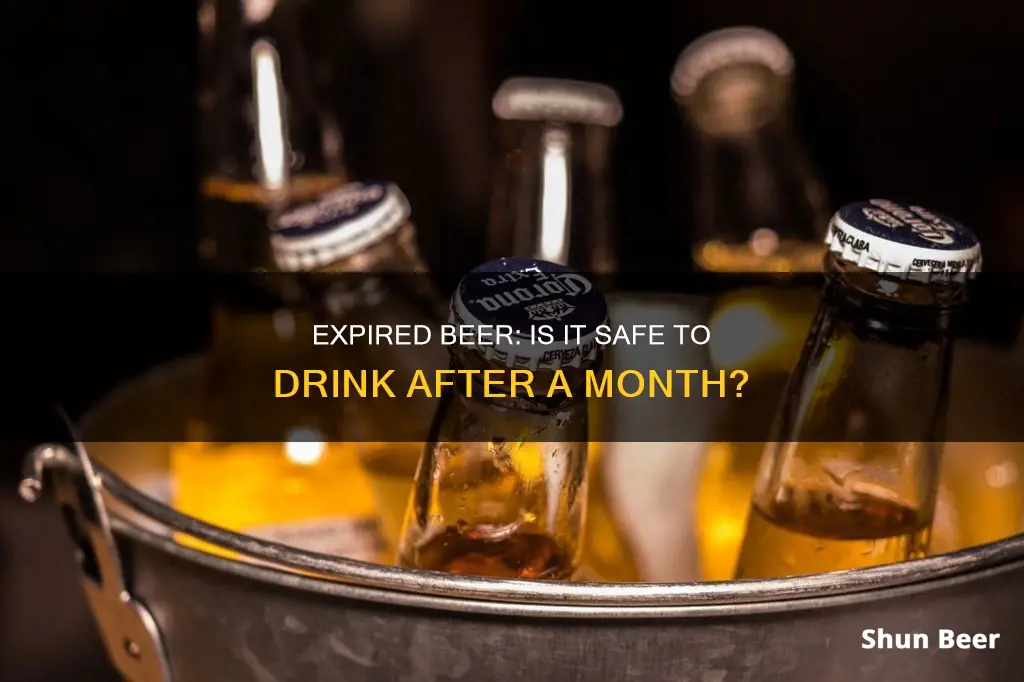
Drinking expired beer is harmless. Beer is similar to wine in that it ages even after bottling, but unlike wine, its taste gets worse over time rather than better. Beer is a perishable product that stales when exposed to light, oxygen, and heat, which degrade the organic compounds that make beer smell and taste great. However, most beer is pasteurized or filtered to eliminate bacteria, making it extremely resistant to spoiling. While drinking expired beer is safe, it might not taste very good, and it's likely to smell odd and taste stale or flat.
| Characteristics | Values |
|---|---|
| Is it safe to drink 1-month-expired beer? | Yes, it is safe to drink beer past its drink-by date. Beer doesn't expire in the same way milk does, and it won't make you sick. |
| How does beer expire? | Beer expires due to light, oxygen, heat, and time. |
| How long does beer last beyond its expiration date? | Beer lasts about 5 to 9 months beyond the expiration date listed on the label at room temperature. In a refrigerator, beer can last up to two or three years. |
| How can you tell if beer has gone bad? | You can tell by the bad aroma, lack of fizz, and vinegary taste. |
| How to store beer to maximise shelf life? | Store beer in a cool, dark place, away from temperature fluctuations. Keep it upright to minimise oxidation, and avoid exposing it to direct sunlight. |
What You'll Learn

Drinking expired beer is harmless
Beer is similar to wine in that it ages even after bottling. Unlike wine, however, after a certain amount of time passes, the taste gets worse rather than better. Beers with higher alcohol content tend to have a longer shelf life. Beers with an alcohol content of 5% can stay fresh for up to 6 months, while beers with 7.5% alcohol content may last for up to a year. Beers with an alcohol content above 10% can last for up to 2 years if stored properly.
To prolong the shelf life of your beer, it's recommended to store it in a dark place, out of direct sunlight, and at the right temperature. Lighter beers such as pilsners and lagers should be stored cooler than standard beers like IPAs and stouts. Canned beer is also likely to last longer than bottled beer because, unlike bottled beer, it is airtight.
Get Rid of Your Beer Gut: Tips for a Trimmer You
You may want to see also

Beer tastes worse with time, unlike wine
Beer has a shelf life, and its flavour degrades over time. While drinking expired beer is harmless, non-toxic, and safe, it might not taste very good and is likely to smell odd and taste stale or flat. Beer is perishable and can go stale when exposed to light, oxygen, and heat, which degrade the organic compounds that make beer smell and taste great. The aroma and flavour compounds found in hops oxidise over time, and these compounds dissipate. The speed of this process depends on the alcohol content of the beer and how it is stored. Beers with more alcohol by volume have a longer shelf life.
Unlike beer, wine gets better with age. Wine is made of organic matter that is constantly getting "riper" due to a phenomenon called micro-oxygenation. The longer wine rests, the more its tannins—the chemicals found in grapes that are used to make the wine—transform from a spikey bitter encounter to a silky smooth experience.
Beer and wine also differ in their calorie content. A pint of beer has 50% more calories than a glass of wine. Beer also has more alcohol by volume than wine, and therefore takes longer to get you drunk.
Finally, beer and wine have different effects on weight gain. While a recent review of studies concluded that neither wine nor beer drinkers tend to put on weight over the short term, the studies could have missed minor weight gain. Over a longer period, the weight gain could be more significant.
Beer and Excedrin: Safe Mix or Not?
You may want to see also

Beer is similar to wine in that it ages even after bottling
Drinking a beer that is a month past its expiry date is harmless, but it might not taste very good. Beer is similar to wine in that it ages even after bottling, but unlike wine, beer's taste gets worse over time rather than improving. The flavour of beer tends to keep improving for a month or two after bottling, then stays steady for several months, before starting to deteriorate and turn stale after about a year.
The speed of this process depends on the alcohol content of the beer and how it's stored. Beers with a higher ABV tend to have a longer shelf life. Refrigerating beer slows the process of ageing, so it's best to store beer in the fridge and consume it within three to six months of packaging, or before the best-before date.
The flavour of beer deteriorates over time due to exposure to light, oxygen, and heat, which degrade the organic compounds that make beer smell and taste good. The hops in beer also play a role in its shelf life. Hoppy beers are considered better fresh than malt-forward ones, and highly hopped beers begin to lose characteristics quickly. Beers with high wheat content also tend to require a faster turnaround than malt-forward and high-ABV beers.
Beer and Clonazepam: Safe Mix or Risky Business?
You may want to see also

Beer is perishable and stales when exposed to light, oxygen and heat
Beer is a perishable product that will eventually go bad. However, this doesn't mean it becomes unsafe to drink. If you drink expired beer, you will likely experience unpleasant tastes and aromas, but you won't get sick.
Beer stales when exposed to light, oxygen and heat. These factors degrade the organic compounds that make beer smell and taste great. The speed of degradation depends on the alcohol content of the beer and how it's stored.
Light exposure, especially UV rays, can cause beer to develop a skunky odour and taste. This is more prevalent in beers packaged in clear or green bottles. Brown bottles offer better protection, and cans completely shield beer from light, helping to preserve its quality for longer.
Oxygen is another factor that contributes to beer staling. The oxidation process occurs more slowly in cans than in bottles because cans don't let any light in. However, even unopened beer can go bad in the fridge, and an opened bottle or can will generally only be good for a day before the oxidation destroys all the good flavours.
Heat also causes beer to go bad more quickly. As a rule of thumb, you can keep beer at 90°F for only 3 days before it goes bad. It will last 30 days at 72°F (room temperature) and up to 300 days at 38°F.
Beer and Painkillers: How Does Ibu Work?
You may want to see also

Beer with higher alcohol content has a longer shelf life
Beer does expire, but it does not become unsafe to drink. The flavour and quality will degrade over time, and it is best to consume beer within three to six months of packaging, or before the best-by date. Beer is perishable and will stale when exposed to light, oxygen and heat, which will affect its taste. The speed of this process depends on the alcohol content of the beer and how it is stored. Beers with more alcohol by volume have a longer shelf life.
The shelf life of beer varies depending on the type and storage conditions. Most beers are best consumed within six to nine months if stored at room temperature. Refrigeration can extend this period to up to two years. Unpasteurised or craft beers may have a shorter shelf life.
The type of beer affects its shelf life. Stronger beers, such as stouts, porters, and high-alcohol content beers, tend to last longer than lighter beers like lagers and pilsners. Hoppy beers, like IPAs, are best consumed fresh to enjoy their full flavour and aroma.
To prolong the shelf life of your beer, store it in a dark place and out of direct sunlight. Beer should be stored upright at the right temperature. While the ideal temperature changes based on the type of beer, standard beers, such as IPAs or stouts, are usually safely stored at 50 to 54 degrees Fahrenheit (10 to 12 degrees Celsius), while lighter beers such as pilsners and lagers should be stored a bit cooler. Beer should be stored in the fridge and consumed within a few hours of opening for peak taste and carbonation.
Enjoying Beer at the Beach: Is It Allowed?
You may want to see also
Frequently asked questions
No, drinking expired beer will not make you sick. Beer doesn't expire in the same way that fresh food does, and the alcohol content prevents pathogenic growth.
Beer is produced with a "best before" date, which is a guideline on quality rather than safety. After this date, the beer will start to lose its quality and will taste bad.
At room temperature, beer typically lasts 5 to 9 months beyond its expiration date. In a refrigerator, beer can last up to 2 to 3 years.
You'll know if your beer has gone bad from its colour, smell, taste, foam density, and overall appearance. If the beer has lost its fizz or has a vinegary taste, it's gone bad.
Beer should be stored in a cool, dark place, away from temperature fluctuations. Keep it upright to minimise oxidation and avoid exposing it to direct sunlight.







